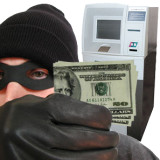Sadly, losing or having your debit card stolen is commonplace these days. Here’s what to do if it happens
The stories come out with the consistency of quarterly earnings reports. From Barnes & Noble to HSBC Bank to Zappos, thieves eager to get their hands on customer data are consistently, and successfully, targeting large companies. And for once, this is definitely a case where the news media can’t be accused of sensationalizing a trivial problem. Indeed, just check out these disturbing facts about the prevalence of identity theft.
A Growing Scourge
- Identity theft is the fastest growing crime in America.
- According to the Federal Trade Commission, there are almost 10 million cases of identity theft annually.
- About 19 million people fall victim to identity theft every minute.
- Each crime costs the average victim $500 and 30 hours to resolve.
- A family member or relative, according to one study, perpetrates 32% of identity thefts. The culprits in 18% of cases are friends, neighbors or in-house employees.
Source: TransUnion: Identity Theft Facts: http://www.transunion.com/personal-credit/identity-theft-and-fraud/identity-theft-facts.page
An Ounce of Prevention
While it’s the big brand names whose security has been breached who get the headlines, the real victims are the customers whose credit and debit card information have been pilfered. What’s even more insidious about the problem is that in many, many instances your physical card will still be snug in your wallet or purse. The upside of our highly digital world is that we can sit in our pajamas and order books, paint, DVDs and steak knives from online retailers like Amazon or Wal-Mart without handing over our debit card to a clerk. The downside, of course, is that when crooks get access to our account details, they can do exactly the same thing.
Obviously, the question is what to do should your debit card information fall into the hands of a criminal. But herein lies one of the most vexing problems with identity theft: if you still have possession of your debit card, how in the world will you even know that a criminal has struck? Well, it might sound a bit like your mother telling you to eat your vegetables, but the Federal Trade Commission offers up a slew of tips on how to minimize what can be significant damage caused by identity theft. Here are just a couple of their ideas:
- Check your ATM or debit card transactions. Unless you’re Paris Hilton or Nicolas Cage, you likely know how you spend your money. If there’s a fishy looking charge, look into it. “The more often you check it the better,” says Dr. Mary Ann Campbell, a CFP who teaches personal and family finance at the University of Central Arkansas and runs the web site www.moneymagic.com. “With free programs such as mint.com, you are able to check balances daily on a smart phone.”
- Don’t help the criminals. This may sound painfully obvious, but never give your account information over the phone unless you’re the one who has initiated the call. And never, ever respond to an email asking for your account details for verification purposes. Credible companies simply don’t do this.
- No carte blanche. Never, ever sign a charge or debit slip that is blank. The amount that someone fills in afterwards may shock you.
Source: http://www.consumer.ftc.gov/articles/0213-lost-or-stolen-credit-atm-and-debit-cards
As the federal agency that seeks to protect consumers from identity thieves, the Federal Trade Commission maintains a treasure trove of information about the problem and provides lots of helpful tips to prevent or respond to it. So by all means, visit the FTC website.
When it Happens
There is one sure-fire way to avoid being a victim of identity theft: live in a cave and cut up your debit cards. For the rest of us, even the most hardcore preventative measures won’t eliminate the risk – that is, unless you can somehow fortify the data storage of every single retailer you’ve ever done business with.
With that unfortunate reality in mind, remember that how you respond will largely determine just how damaging and costly identity theft will be. The most important thing to remember is to report the loss of your debit card immediately to the bank. For this very reason, banks have 24-hour emergency phone numbers. If you determine your card was stolen at 2 a.m., you are better off reporting the card stolen then. Who could sleep, anyway? “Act fast! Be prepared like a good boy or girl scout and already have a copy of your debit card front and back,” says Campbell. “Or your debit card information copied in your phone or computer, particularly the 800 number to contact to let them know the card has been lost or stolen.”
Even though calling in the middle of the night can be a hassle, waiting until morning could allow for numerous unauthorized charges and make an already big mess more difficult to clear up. What else can you do? Try these steps:
Grab your laptop. You should log into your online bank account as soon as you can and carefully review all debit card activity. Since transactions are typically reported immediately, all the fraudulent charges should already be posted. Take note of each and every one so that you can report them to your bank. (Note: If the merchant put the transactions through as credit instead of debit, they may not appear right away).
Be a pain. There are times in life when it makes sense to be polite and reserved. This is not one of those times. Follow up with your bank daily until the issue is 100% resolved. As Dave Ramsey may say on his radio show, “Make calling the bank your job.” You may also hear him say to “make calling the bank your goal in life.” In other words, call the bank every day, even multiple times a day until the issue is resolved to your satisfaction. The bank will close your debit card account and issue you a new card. But until all the fraudulent charges are removed, you should stay in close contact with your bank. Along the way keep meticulous records of emails, correspondence and phone calls, including the name of the person at the bank you spoke to.
See if you’re covered. Dust off your renters or homeowners insurance policy and read the fine print — some policies cover card theft. And for future reference, keep the fact that some policies do cover it in mind and consider adding it to your policy.
Know Your Rights
While it’s important to act thoroughly and fast if your debit card is stolen, it is also important to arm yourself with knowledge about your rights under the law. The most important thing to know is that, under federal law, your liability is limited, although your level of protection against unauthorized charges varies. It depends on the type of card used and how quickly you report the loss. The difference can be substantial. Early reporting can limit your loss to $50. But, after two days, the maximum loss allowed jumps up to $500.
To be more specific, the federal laws that offer consumer protection when your debit card is lost or stolen are the Fair Credit Billing Act (FCBA) and the Electronic Fund Transfer Act (EFTA). Not only is FCBA the reason your liability for unauthorized charges capped at $50, it also says that if you report the card lost or stolen before it’s ever used, you won’t be liable for any charges whatsoever. When it comes to your debit card, EFTA protects you from some liability. If the card is used before it’s reported lost or stolen, uh-oh, you may have some inescapable losses. Here’s what you could be out of pocket:
| HOW QUICKLY YOU REPORT THE PROBLEM |
YOUR MAXIMUM LOSS |
| Before any fraudulent transactions have been made |
$0 |
| Within two business days |
$50 |
| Two to 60 business days later |
$500 |
| More than 60 business days later |
All the money taken from your ATM/debit card |
Source: http://www.consumer.ftc.gov/articles/0213-lost-or-stolen-credit-atm-and-debit-cards
There is a caveat to all this. If your debit card number is used, but the card itself isn’t stolen, you have 60 days to report the charges as fraudulent.

